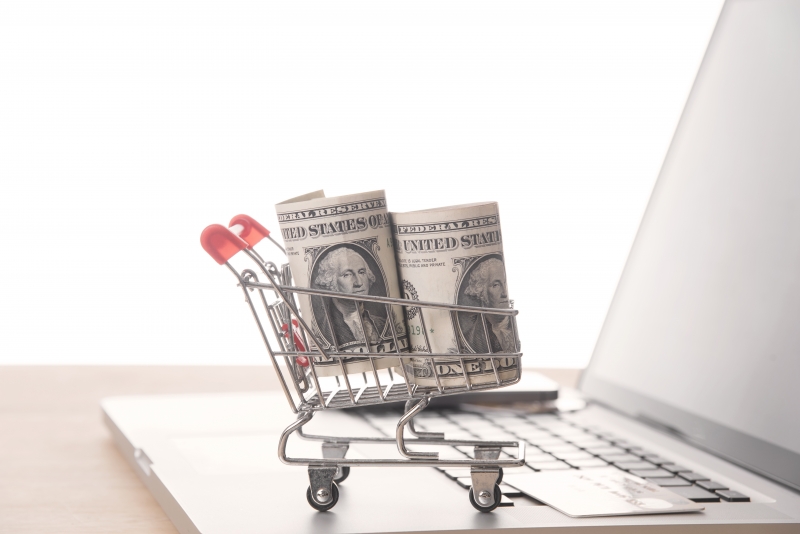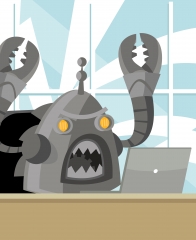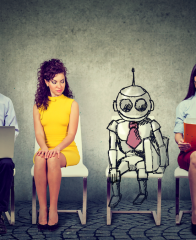 / Don't Blame the Computers!
Subscribe
/ Don't Blame the Computers!
Subscribe

Have you listened to Julie Walsh and Cord Whitaker's sound bite on the Spoke, "Are Computers Destroying the world?"
You should, it's short and fun!
But, as the computer scientist in residence, I cannot pass on the opportunity to disagree: no, computers are not destroying the world! Unless, we, as a society, allow companies and governments to use them against us. But more on this below.
To start, let me deconstruct the first example that Cord brings up: cash registers at the supermarket that don't work and make us wait too long.
There are usually a few reasons why we might get delayed at a modern computer-run cash register. Sometimes the company that implemented the software did a poor job of writing a good program that everyone from age 14 to 70 (the age-range of cashiers) can easily use. Developing user interfaces that can be used intuitively requires significant time investment from experienced user interface designers. Apple, Facebook, and Google have thousands of (extremely) well-paid engineers to design their extremely popular products. Supermarket chains do not.
Other times, the human operators don't have the sufficient training to use the software running on these computers. This is usually because software is updated more often than humans and the companies they work for, can keep up with. But, more often, errors and delays occur because software is badly written. It's a perpetual loop of mutual frustration. Software companies update their software to make it "better," users, who have to use it all day long, cannot make the immediate mental switch to accommodate the new updates. In fact, for this very reason, the computer industry has moved away from requiring a keyboard or mouse to enter commands, and toward the use of touch screens. This is why phones and tablets have overtaken laptops and desktops in number. And even touch screens are becoming out dated---voice controls are becoming more and more prevalent. (Think of Siri, or Amazon's Alexa, and Google Home).
However, let's put aside the technical issues for a moment and think about the why. Why is there a computer at every cash register?
Efficiency. And of course, its twin brother, profit.
All the cashiers' computers are connected to the Internet. The details of your purchases, scanned at the register, are streamed at light speed through the network. In some room at the supermarket offices, another computer program is monitoring all the purchases in real-time. This program also knows the amount of goods stocked in the shelves that day. If the shelves are nearing depletion, the program will notify someone to refill them immediately, lest consumers think the store managers don't care about meeting their needs. Well, of course they care. They care to keep selling their products. And they care about getting you to buy more of them, even, or even especially, when you are not thinking about or planning to buy.
Have you ever heard the "diapers and beer" data mining story? It goes like this. Researchers who analyzed the content of "baskets" (what a consumer buys in one trip to the supermarket) discovered that some costumers bought diapers and beer together. They hypothesized that when fathers are sent to the store to buy diapers, finding themselves there, they also buy beer for themselves. The researchers then suggested to the store managers that they put the beer next to the diapers to make it easier for fathers to indulge. The sales soared, and everyone lived happy ever after.
When this story came out in the 90s, it was initially just an anecdote, but the possibilities it suggested made it irresistible to retail stores. What if a company knew the exact life circumstances of a costumer? What if they could anticipate that you are a young father, an expecting mother, an elderly person with diabetes? Could a company predict the products you would need to buy next and send you personalized coupons to get you back to the store?
That is exactly how companies started to use computers: collect the data at the register, and then apply data mining programs to predict who you are and what you need to buy next. Initially, such efforts were clumsy. You might remember the infamous Target story, in which a teenage girl, who hadn't notified her family that she was pregnant, received advertising to buy baby products in the mail---to the home she shared with her parents. Her father, very upset, called the store to complain one day, and to apologize the next. The story has become a textbook example of how to avoid crossing the line into intrusiveness with personalized advertising.
There is one straight line of argument that connects the efforts of brick-and-mortar retailers for increasing efficiency and profit to computers: competition in an Internet-enabled world. The New York Times recently did a feature on the richest man in the world, Jeff Bezos, the owner of the biggest online retailer in the world, Amazon. Amazon is worth more than Walmart, Costco, and Target combined. Why? Because Amazon knows who you are, what you have bought, and what you are contemplating buying. It is no coincidence that loyalty and rewards card programs exploded in the late 90s. Retailers understood that to retain costumers, they would need to keep track of what they bought, where, when, and how. Credit cards and rewards cards serve exactly that purpose. It's eavesdropping wrapped under layers of convenience and savings.
And all this data about us is out there for companies such as Equifax (the consumer credit reporting agency) to use and profit from, and, as perhaps was inevitable, to be hacked by malicious actors. Social security numbers and other personal details of 145 million U.S consumers were stolen in a cyber-security breach at Equifax in 2017. But, as a society, we are not outraged enough about this massive intrusion in our privacy to make this kind of data collection by companies and government illegal.
It is not the computers' fault. It's easy to anthropomorphize them; they seem smart and all-knowing. But they don't have agency. Companies do. In this country, they have the same rights as we humans, and more.
It might get worse. In the dystopian science fiction novel "Ready Player One," which Steven Spielberg has turned into the same-titled movie coming out in March 2018, the main character Wade Watts enters a cab and pays with his fingerprint. In their sound clip, Cord and Julie were worried about ATMs not working and us not being able to get cash when computers couldn't work. But who will need cash when we'll have to use our fingerprints and iris scans for every transaction? Americans still believe that only criminals get their fingerprints taken. Wrong. The question is how long it will be until this becomes the law for everyone? Will we continue to blame computers or will we open our eyes to who is controlling and using them to undermine our civil rights and human dignity?
But maybe being able to bypass the cashier and not wait at the line will be sufficient for us to forget about such intrusion. Amazon just opened its first checkout-free grocery store in Seattle this Monday. Happy shopping!
Photo Credit: This is Me, "Shopping cart with dollar money on computer," via Shutterstock, 24 January 2018.






